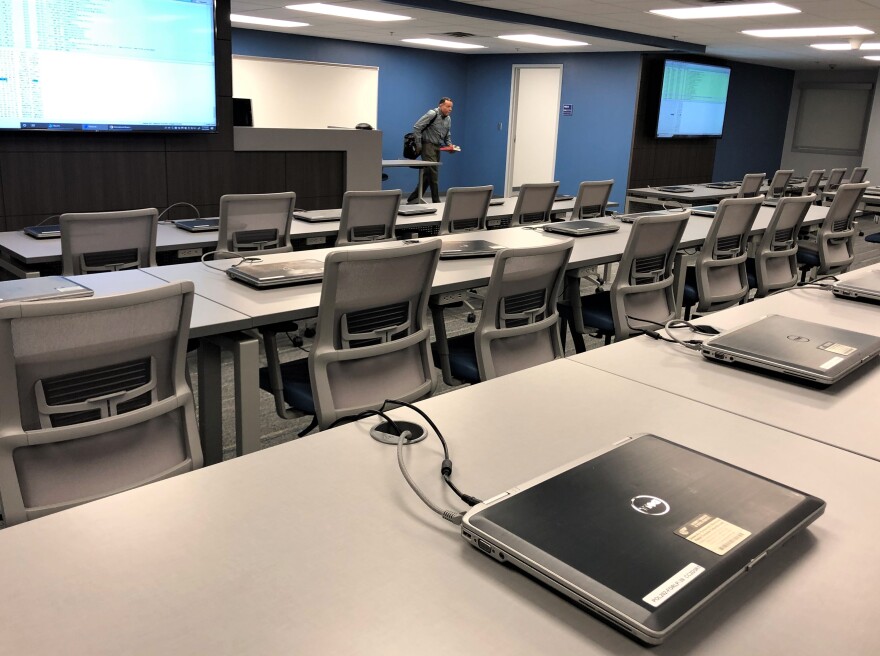Like death and taxes, being hit by a computer virus seems inevitable.
Cybercrime took a $100 billion bite out of the U.S. economy last year alone.
It’s not just individuals who are hacked. Cities, schools and small businesses are increasingly targeted.
In this week’s Exploradio, a look at local efforts to fight the onslaught by training the next generation of cyber warriors.
Kelly Kendrick is IT director at Coventry Local Schools, a small district south of Akron.
She says what began as an ordinary school day earlier this year began to go awry as the Internet slowed and files got jammed.
“And then we realized there was a pattern,” says Kendrick.
Soon it dawned on her that the school was under attack. “Within a 24 hour period we had to shut down the entire district,” she says.

A malicious virus had not only taken over their computer network, it had disabled the heating and cooling systems and wiped out phone service.
Luckily, she says they were able to stop the virus before it put a lock on the schools' financial data.
After only one day of cancelled classes, Kendrick says they limped through the final week of school, “and then we spent the entire summer rebuilding our network."
From cyber crime to cyber warfare
The FBI determined that Coventry schools had been attacked by the TrickBot virus, launched by criminals outside the U.S.
It’s part of a growing trend of schools, cities, and small businesses being targeted by ransomware and other cyber attacks. “It’s gonna to happen to everybody sooner or later,” warns John Nicholas, who teaches cyber security at the University of Akron.
He says the attacks leveled against communities across America have morphed from cyber crime to cyber warfare.
“You don’t know if that virus came from a nation-state that was designed for military purposes, or if it came from a terrorist group, or is it just some criminal trying to get your information. You can’t tell anymore.”

The University of Akron is teaching students the art of cyber warfare in a newly built classroom.
Stan Smith is a retired Akron police officer who specialized in tracing digital evidence. Now he teaches students how to deploy the bizarrely named tools used to fight hacking attacks.
“Nmap, snort, TCPdump, Wireshark, these are the tools that defenders would be implementing,” says Smith.
Smith runs me through a simulated cyber attack using Wireshark. It's the first line of defense in a compromised system where even the command prompt is locked up.
A jumble of numbers identify the intruder. "That’s the attacker,” says Smith, who deftly blocks the hack.
Smith says this is not just a classroom, it’s the equivalent of a combat firing range, “although our weapons are logical weapons as opposed to the physical.”
A new Cyber Reserve
The ‘cyber range’ at the University of Akron is one of two in the state, with a similar set-up at the University of Cincinnati.
It’s part of an effort to bolster cyber defenses statewide by training a new generation of cyber warriors.
Major General John Harris, Adjutant General of the Ohio National Guard, says his cyber teams will train at the cyber range, "where we can practice the craft without affecting true critical infrastructure.”
Harris commands three National Guard cyber response teams, and is building a separate civilian Cyber Reserve to assist those units in educating the public about the risks of cyber attacks.

He says what keeps him up at night, is how vulnerable we still are, “everything from our locks and dams systems, to our energy producing facilities to our switching facilities, both hardware and software.”
Learning how to defend these kinds of systems is part of what got Colin Carrick interested in Akron’s cyber security program. He says part of fighting cyber crime is getting inside the mind of a hacker.
“They do it because they love the challenge," says Carrick. "They love the drive of getting into governmental services, or even corporation servers.”
Upgrades and vigilance
The University of Akron’s John Nicholas says, whether from individuals hackers, or crime syndicates, the onslaught is relentless. “There’re 40,000 new viruses released every day," he says, "and there are as many as 400 million out there.”
Nicholas says all of us are vulnerable, and all of us need to be vigilant.

“Most of the time the problem is between the keyboard and the chair, because we click on that ‘I love you’ email, or we click on that nice ad with a coupon for our favorite store, and it contains a virus.”
Nicholas recommends constantly updating software patches and keeping up with security alerts.
Even with those precautions, Coventry Schools’ Kelly Kendrick says, one slip is enough.
“In the click of a button," she says, "and then it’s too late.”
A lesson that cost the district $75,000 to rebuild the computer system from scratch.
Support for Exploradio comes from the Burton D. Morgan Foundation.










